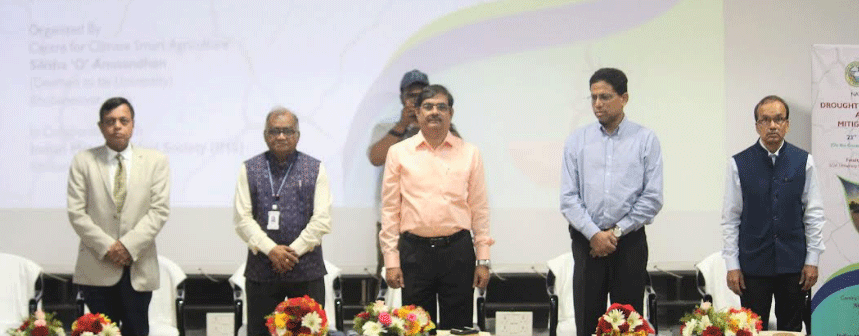Bhubaneswar: Integration of multi-disciplinary expertise, observational data set and prediction tools for early warning on initiation of drought, particularly flash drought, in Odisha has been stressed by an internationally acclaimed expert.
Prof. Binayak Mohanty, Professor at Texas A&M University, USA, who attended an international workshop organised at Siksha ‘O’ Anusandhan (SOA) here recently, also underlined the importance of soil moisture dynamics, temporal variability, intensity and frequency of observation for better crop and water management, particularly under drought condition.
The workshop on ‘Drought Scenarios in Odisha: Adaptation and Mitigation Strategies’ was jointly organised by SOA’s Centre for Climate Smart Agriculture (CCSA) and the Bhubaneswar chapter of Indian Meteorological Society.
Prof. Mohanty, who is known as a global leader in use of satellite remote sensing as a tool to study soil moisture, soil hydraulics and evapotranspiration at different scales, also serves in the science team of NASA Soil Moisture Active Passive Mission. He is involved as an international advisor with CCSA.
Experts who attended the workshop also emphasized the need for preparing composite drought indices for different blocks of the state by integrating the meteorological, hydrological, agricultural and socio-economic data.
The workshop recommended that assessment of effect of short and long-term drought on integrated farming system comprising agriculture, horticulture, agro-forestry, livestock and animal husbandry should be made and suitable remedial measures initiated, starting with most affected blocks of the state.
SOA Vice-Chancellor Prof. Bijay Kumar Sahoo presided over the inaugural program which was also attended by Pro-Vice Chancellor Prof. Pradipta Kumar Nanda.
The other experts who took part in the deliberations included Dr. Arjamadutta Sarangi, Director of ICAR-Indian Institute of Water Management, Bhubaneswar, Dr. Prasant Kumar Mishra, former Director, Indian Institute of Soil and Water Conservation, Dehradun, Prof. R.K.Panda, Director, CCSA, Dr. Meenu Ramdas from IIT, Bhubaneswar, Mr. Sanjeev Kumar Nayak, Regional Coordinator, Odisha Millet Mission, Prof. Basudev Behera, Professor of Agronomy, SOA’s faculty of agricultural sciences, Dr. Nihar Ranjan Das of CCSA, Dr. Pravat Sarangi, faculty of Agricultural Sciences and Dr. Vasundahara Borde, former research scholar at IIT, Bhubaneswar.
Two technical sessions were held which were chaired by Prof. U.C. Mohanty, a leading expert in Atmospheric Science.
The newly launched CCSA aims to develop an innovative sustainable farming system to cope with the varying climate scenarios for enhancing productivity and income of farmers and increasing climate resilience, its Director Prof. Panda said.
Prof. Panda said the priority at present was to encourage smart agricultural practices adapting to changing climate patterns and mitigation of greenhouse gas (GHG) emission. Innovative ‘climate smart’ and ‘climate resilient’ agriculture and natural resources management practices would have a positive impact on food production, carbon sequestration, soil health, water sustainability and greenhouse gas emission, he said.
“Innovative technology and data-driven decision support system using publicly available satellite remote sensing, ground monitoring and drone data, as well as crop-growth models which integrate climate, crop, water, soil, energy and labour are necessary for optimal use of scarce resources like land, water, energy and labour to enhance agricultural production and productivity,” he said adding Artificial Intelligence and Machine Learning have the potential to help address this challenge.
Experts from SOA, in collaboration with the state government and other stake holders including the local community would initiate appropriate adaptation measures to combat the adverse effect of drought, Prof. Panda said.


